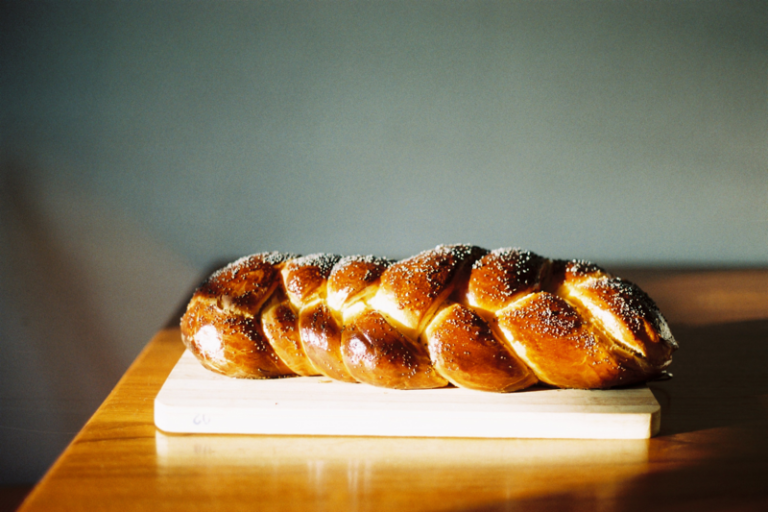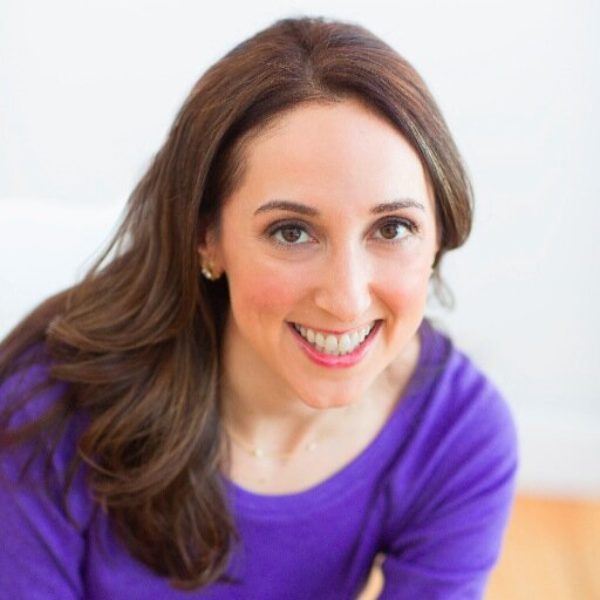
Image by Michelle Gow.
Challah Back: Braiding, Baking, and the Mitzvah of Opportunity
I didn’t intend to become The Challah Lady of Minneapolis. I only wanted to know how to bake challah for my family, and maybe only as a one-time lesson in case I found the process too tedious. Purchasing a challah at the grocery store was easy enough.
Nevertheless, there’s no denying it, I’m the Challah Lady. If I’m not baking challah with other women in my house, then I’m getting a request to schedule a class, or I’m answering frantic texts late on a Friday afternoon from past participants who forgot the best way to defrost a frozen loaf. I’m neither a professional cook nor a Jewish professional, yet challah has taken over my life. However, I think of myself as the “Unlikely Challah Lady,” because I became something of a guru on the subject in an unexpected way.
I had little access to Shabbat during my childhood, and therefore, little access to challah, which would make its weekly appearance at the Friday night Shabbat meal. My parents instilled a strong Jewish identity in me, but they did so with little ritual. Neither my mother, my grandmothers, nor my great grandmothers made Shabbat dinners or challah and they rarely purchased challah. The only loaves I remember eating were the round ones my mom bought for the High Holy Days.

I didn’t encounter Jewish peers who grew up in homes with Shabbat until college. These kids, mostly from backgrounds in Conservative Judaism, were dedicated to Friday night dinners. They hosted big gatherings in the dorms and voluntarily went to services. I came along, but I was frustrated with my inability to follow along with even basic elements of Jewish literacy despite all those years of Hebrew school. I realized quickly that if I wanted to fill in the holes of my Jewish education, I would have to do so myself.
Two months before the first challah class at my house, my husband and I joined an Orthodox synagogue (even though we’re not Orthodox, but that’s another story), and the rabbi invited me to participate in a meeting about creating new programs specifically of interest to women.
“How about a challah class?” the rabbi suggested.
“A challah class?” I responded in a disgusted tone. I was tired of leaders in the various Jewish groups I’d joined over the years suggesting women get together to cook.
“I don’t want to hear another rabbi suggest a challah class,” I said. “And I don’t know anyone else who would be interested.”
Nobody dared mention the word challah in front of me again. Then a few months later, around Rosh Hashanah, I decided that my personal Jewish challenge would be to bake my own challah, but not as a synagogue program, or as a “get women involved” initiative.
I asked my friend Tzipporah Leah, who happens to be the wife of the rabbi I yelled at during the meeting, if she would teach me her recipe. I heard she made the best challah with a streusel topping, and I knew that learning how to deal with the yeast and mastering the braiding techniques would work best in my kitchen with my own supplies. When a few friends heard me talking about my interest in challah, they asked if they could join me.
I bought all the ingredients, my three friends arrived with their own baking supplies, and Tzipporah Leah came with her expertise. By the end of a few hours, the five of us had a meaningful conversation, time to pray together as we said the blessing for separating a piece of dough — the somewhat bizarre mitzvah, or commandment from the Torah, involved in making any large batch of bread — and we each had seven loaves of gorgeously braided challah. The sight of all those loaves inspired me to put a photo on Facebook. “ Learned how to make challah!” I wrote. Within minutes I received dozens of comments like, “I’d love to learn.”
Despite no intention to host another class, Tzipporah Leah and I put together another session to include the first few women who had expressed interest. Again, I posted the picture of our many loaves and this time a few friends felt insulted that they were not invited. I also got more comments directly on Facebook asking when I would schedule another class.
By November I had so many requests that it made sense to create a page on Signup Genius, which kept me out of personally deciding who would come. Tzipporah Leah and I agreed on five dates, and I put the link to the signup page on Facebook, offering five slots per session. By the end of the day, the spots were full. When the last class scheduled on the signup form took place, Tzipporah Leah and I would pick more dates and the slots would fill quickly. This went on for over a year even though we both have four kids, work complications, and other interests in our lives beyond challah. How could we say no to such organic enthusiasm for baking bread?
Each class was structured exactly the same way. When the four or five participants arrived, I’d give out name tags since the women did not usually know everyone else. We’d start with small talk while measuring ingredients for our own large batches and continue getting to know each other while kneading the dough by hand.

As the dough rose, we’d sit in my living room while Tzipporah Leah led an unfiltered discussion about how she feels about baking challah, never shying away from her beliefs about God and the mystical concepts about the connection made after saying the blessing for separating dough. For some of the women, it was the first time they’d heard anyone talk so directly about God and the idea of a mitzvah as an opportunity.
I also discussed my motivation to bake challah, retelling how I’d become interested since I was 18 in learning more about many different Jewish practices, some of which have stuck better than others. I expressed how I’m driven by the idea of a chain of Jewish knowledge reaching back through the generations, which most of my American ancestors have set down and let rust. I wanted to give the chain a new shine, not for the sake of an impossible-to-guarantee continuity in the next generation, but for me, because the more I know about Judaism, the more it adds depth to my life.
Tzipporah Leah talked about getting together with her many cousins when they were kids to make challah with their grandmother, each family unit putting a certain number of toothpicks in the loaves so they’d know what to take home. In every challah session, at least one of the participants would cry and another, or sometimes the same woman, would cry when we went back to the kitchen to say the blessing one-by-one and answer Amen to each others’ shared and silent prayers for loved ones’ health and other personal matters before Tzipporah Leah taught the group several ways to braid. Each woman left with at least six loaves to bake at home and I’d wait eagerly for the pictures of their finished golden loaves later in the day.
I’ve had Jewish and non-Jewish professionals in town ask how, when so many religious groups were struggling to get participants for even brief programs, were Tzipporah Leah and I struggling to keep up with the demand for an experience that took three hours in my house with more time required for each woman to bake the loaves in their homes?

In retrospect, my bias against cooking classes had nothing to do with the act of baking bread, and had everything to do with my preference for a small, intimate experience that takes place in a home rather than a synagogue or a community center. The women in my classes seemed to agree.
I learned that hard work and intention make a real difference. Tzipporah Leah and I each put in over 100 hours, and it wasn’t to strengthen any institution’s membership. Tzipporah Leah often forgot to tell the group that her husband is a rabbi. Our classes were a labor of love that started with my desire to add challah to my Jewish repertoire and continued because, with a little help from Facebook, the ruach, the spirit, cooking up in my kitchen became contagious. People wanted in, we didn’t have to ask them.
A year and a half and 18 classes later, I still make a large batch of challah every four weeks, sometimes with other women, but more often, alone, where even in the quiet of my kitchen I can hear the earnest voices of women in my community, many of them strangers, saying the prayer for separating dough for the the first time. As I knead, wait for the dough to rise, then say the prayer before I braid and bake, I feel content knowing that I played a part in connecting all those women to the mysterious pull of heritage, ritual, and community.


Share your reflection